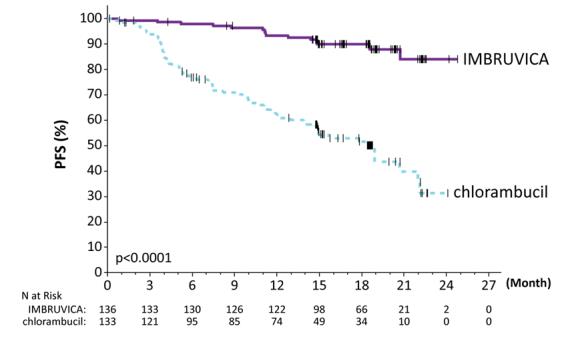FDA records indicate that there are no current recalls for this drug.
Are you a medical professional?
Trending Topics
Imbruvica Recall
Get an alert when a recall is issued.
Questions & Answers
Side Effects & Adverse Reactions
There is currently no warning information available for this product. We apologize for any inconvenience.
Legal Issues
There is currently no legal information available for this drug.
FDA Safety Alerts
There are currently no FDA safety alerts available for this drug.
Manufacturer Warnings
There is currently no manufacturer warning information available for this drug.
FDA Labeling Changes
There are currently no FDA labeling changes available for this drug.
Uses
IMBRUVICA is indicated for the treatment of patients with mantle cell lymphoma (MCL) who have received at least one prior therapy.
Accelerated approval was granted for this indication based on overall response rate. Continued approval for this indication may be contingent upon verification of clinical benefit in confirmatory trials [see Clinical Studies (14.1)].
IMBRUVICA is indicated for the treatment of patients with chronic lymphocytic leukemia (CLL) who have received at least one prior therapy [see Clinical Studies (14.2)].
IMBRUVICA is indicated for the treatment of patients with chronic lymphocytic leukemia (CLL) with 17p deletion [see Clinical Studies (14.2)].
IMBRUVICA is indicated for the treatment of patients with Waldenström's macroglobulinemia (WM) [see Clinical Studies (14.3)].
History
There is currently no drug history available for this drug.
Other Information
Ibrutinib is an inhibitor of Bruton's tyrosine kinase (BTK). It is a white to off-white solid with the empirical formula C25H24N6O2 and a molecular weight 440.50. Ibrutinib is freely soluble in dimethyl sulfoxide, soluble in methanol and practically insoluble in water.
The chemical name for ibrutinib is 1-[(3R)-3-[4-amino-3-(4-phenoxyphenyl)-1H-pyrazolo[3,4-d]pyrimidin-1-yl]-1-piperidinyl]-2-propen-1-one and has the following structure:

IMBRUVICA (ibrutinib) capsules for oral administration are supplied as white opaque capsules that contain 140 mg ibrutinib as the active ingredient. Each capsule also contains the following inactive ingredients: croscarmellose sodium, magnesium stearate, microcrystalline cellulose, sodium lauryl sulfate. The capsule shell contains gelatin, titanium dioxide and black ink. Each white opaque capsule is marked with "ibr 140 mg" in black ink.
Sources
Imbruvica Manufacturers
-
Pharmacyclics, Inc
![Imbruvica (Ibrutinib) Capsule [Pharmacyclics, Inc]](/wp-content/themes/bootstrap/assets/img/loading2.gif)
Imbruvica | Pharmacyclics, Inc
![Imbruvica (Ibrutinib) Capsule [Pharmacyclics, Inc] Imbruvica (Ibrutinib) Capsule [Pharmacyclics, Inc]](/wp-content/themes/bootstrap/assets/img/loading2.gif)
2.1 Dosing GuidelinesAdminister IMBRUVICA orally once daily at approximately the same time each day. Swallow the capsules whole with water. Do not open, break, or chew the capsules.
2.2 DosageMantle Cell Lymphoma
The recommended dose of IMBRUVICA for MCL is 560 mg (four 140 mg capsules) orally once daily.
Chronic Lymphocytic Leukemia and Waldenström's Macroglobulinemia
The recommended dose of IMBRUVICA for CLL and WM is 420 mg (three 140 mg capsules) orally once daily.
2.3 Dose Modifications for Adverse ReactionsInterrupt IMBRUVICA therapy for any Grade 3 or greater non-hematological, Grade 3 or greater neutropenia with infection or fever, or Grade 4 hematological toxicities. Once the symptoms of the toxicity have resolved to Grade 1 or baseline (recovery), IMBRUVICA therapy may be reinitiated at the starting dose. If the toxicity reoccurs, reduce dose by one capsule (140 mg per day). A second reduction of dose by 140 mg may be considered as needed. If these toxicities persist or recur following two dose reductions, discontinue IMBRUVICA.
Recommended dose modifications are described below:
Toxicity Occurrence MCL Dose Modification After Recovery
Starting Dose = 560 mg CLL and WM Dose Modification After Recovery
Starting Dose = 420 mg First Restart at 560 mg daily Restart at 420 mg daily Second Restart at 420 mg daily Restart at 280 mg daily Third Restart at 280 mg daily Restart at 140 mg daily Fourth Discontinue IMBRUVICA Discontinue IMBRUVICA 2.4 Dose Modifications for Use with CYP3A InhibitorsAvoid co-administration with strong or moderate CYP3A inhibitors and consider alternative agents with less CYP3A inhibition.
Concomitant use of strong CYP3A inhibitors which would be taken chronically (e.g., ritonavir, indinavir, nelfinavir, saquinavir, boceprevir, telaprevir, nefazodone) is not recommended. For short-term use (treatment for 7 days or less) of strong CYP3A inhibitors (e.g., antifungals and antibiotics) consider interrupting IMBRUVICA therapy until the CYP3A inhibitor is no longer needed [see Drug Interactions (7.1)].
Reduce IMBRUVICA dose to 140 mg if a moderate CYP3A inhibitor must be used (e.g., fluconazole, darunavir, erythromycin, diltiazem, atazanavir, aprepitant, amprenavir, fosamprevir, crizotinib, imatinib, verapamil, and ciprofloxacin) [see Drug Interactions (7.1)].
Patients taking concomitant strong or moderate CYP3A inhibitors should be monitored more closely for signs of IMBRUVICA toxicity.
2.5 Dose Modifications for Use in Hepatic ImpairmentFor patients with mild liver impairment (Child-Pugh class A), the recommended dose is 140 mg daily (one capsule). Avoid the use of IMBRUVICA in patients with moderate or severe hepatic impairment (Child-Pugh classes B and C) [see Use in Specific Populations (8.7) and Clinical Pharmacology (12.3)].
2.6 Missed DoseIf a dose of IMBRUVICA is not taken at the scheduled time, it can be taken as soon as possible on the same day with a return to the normal schedule the following day. Extra capsules of IMBRUVICA should not be taken to make up for the missed dose.
Login To Your Free Account


